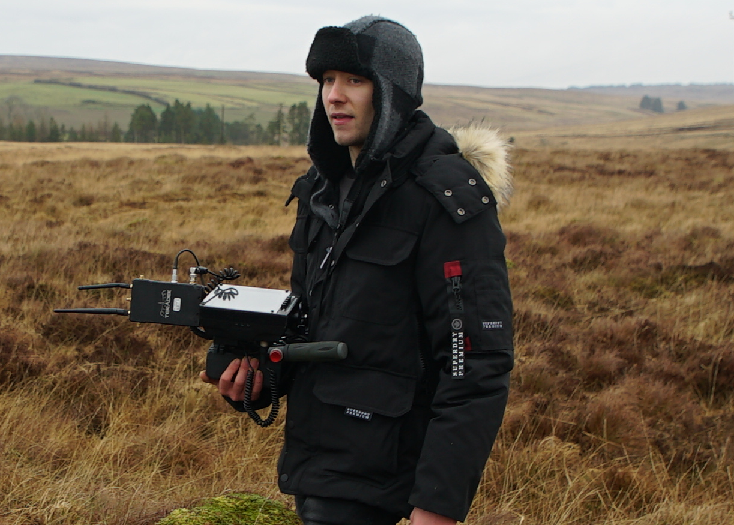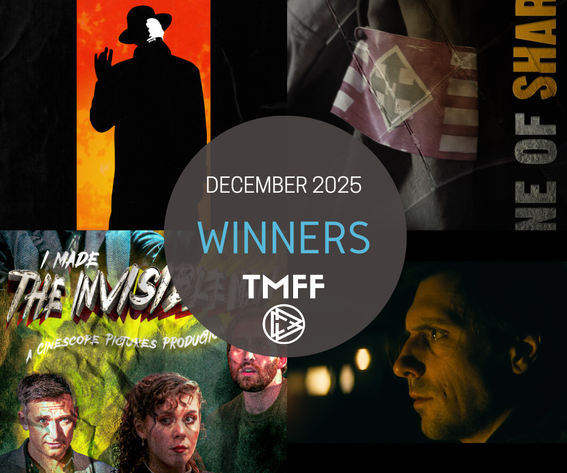November is a time for reflection, rain and gloomy days with no sunlight. Just like Scotland. November‘s big winner, The Lost Scot, appropriately takes place in Scotland, and expertly makes light work of an otherwise sombre premise. It’s exactly what we needed for a November winner, and so we decided to have a few words with director Julien Cornwall.
JL: Julien, congratulations for your success this month! Has your film been performing to your expectations in competitions that it has participated in?
Julien: Thank you so much. I am thrilled to win an award so early into the festival run; it means a lot and hopefully is a sign of more good things to come. It’s quite early days for my film so I have been taming my expectations. Dark comedies are a niche so I really don’t know what to expect. I did receive a lovely email the other week though from the UK FIlm Review team, who have asked to include my film in a book they are writing for the Top 20 Short Films of 2019, which is amazing to hear.
JL: The plot point which starts everything rests upon an unexpected accident. How did you get the idea?
Julien: I was invited to go grouse shooting about a year and a half ago by a friends family. Being the city boy I am, I had never been hunting or grouse shooting before so fancied the challenge. Little did I know that challenge almost ended up with me fatally shooting a Scotsman. Out in the moorlands, a grouse flew low and fast out of the forest, catching me off-guard. I heard the roar of a gamekeeper shouting at me to look left. I spun and pulled the trigger. Did I see a Scotsman in my line of vision? No. Was I well trained and a confident shot. Absolutely not. Did I hit the grouse and see it explode into a ball of feathers? You’re damn right. This was my first and last successful shooting experience as I took an earful from several angry scots. My gun was confiscated, and the Scotsman I’d narrowly missed handed me the leftover remains of the stricken grouse. I felt bad and extremely bloody lucky. This event inspired me to write ’The Lost Scot’ which looks at what may happen to three city boys from London, with less luck than me.
JL: What does Scotland have to offer from a filmmaking point of view?
Julien: From a filmmaking perspective, for me, Scotland has everything. It has the most incredible landscapes with such raw beauty. Its sunsets are one of the most beautiful things I have ever seen. It also has such a great history and collection of stunning films that have been shot there such as Skyfall, Prometheus, Braveheart etc. For me its nature and environment has its own character, its weather is so temperamental. In one day, you can see all variations of an entire season. For continuity, it can be a nightmare to film, but if you’re lucky, whatever you shoot will be stunning.
JL: The Lost Scot is a game of stark contrasts – the gloomy and uninhabited vast stretches of land collide with an impressive sense of humour and light atmosphere. How did you manage to reconcile the two.
Julien: When I wrote the script I had recently re-watched the feature film ‘In Bruges’ by Martin McDonagh and loved the concept of a character being stuck in a beautiful location, and hating it for no reason. For me, that is where most of the dark comedy unfolds, as we have such a beautiful environment, that these characters can’t appreciate as they are too busy arguing with each other. I wanted to see this progression in the film that as their situation worsens, so too does the weather around them. This is why it starts so beautifully lit, having this rustic feel, and steadily progresses into nightfall with rain and heavy wind. I wanted to create a sense of even the environment mocking the boys’ situation. I feel this was strongly reinforced with the choice of music by George Bizet – Carmen Habenara, which plays which such a sarcastic undertone.
JL: Is your film also meant to metaphorically hint at the social and political relationship between England and Scotland, or would you rather simply take it for what it is?
Julien: I’d like to think my film does touch on the social/political relationship that England and Scotland have in some ways, but I honestly can’t take much credit for it. My goal was to make an entertaining film and make the audience laugh. I tried to avoid writing stereotypes and tropes, which I did find a challenge. At a stretch, if anything can be interpreted from my film, is that British people and Scottish people do have this brilliant, quirky love/hate relationship. Even though we are apart of the united kingdom, we are different in our traditions and cultures and that North/South divide is something we all know exists but like to imagine it doesn’t.
JL: What was the most difficult aspect during the entire process?
Julien: I would say the weather and timing was the most difficult aspect. We had found the location back in October 2018 and been told the only time available to shoot would be in January. A lot of the film takes place outside, and we knew that in January we had minimal hours of daylight to work with, and that the weather could be brutal with the potential of blizzard snowstorms. We were largely lucky with the weather, though the wind did cause a lot of anxiety with our sound recordist. However, on the third day of filming, at the cottage scene where the boys arrive in their buggy in one long take, we had to cancel the afternoon of shooting as it started to pour with rain with heavy thunder. We didn’t have enough vehicles to bring all the crew back, so the AD, myself, and production manager decided to take the hit and walk. We walked 40 minutes back to our lodgings and got soaked from head to toe, our clothes unable to recover. I feared for the worst, not knowing when the storm would end, but luckily it had cleared for the following morning. Thanks to our brilliant colourist we managed to piece the cottage scene together even though it had been shot across two days in different weather.
JL: How about the easiest?
Julien: I would say working with the cast. They were brilliant. They had such amazing chemistry and gave such brilliant performances. I could feel the energy and enthusiasm even during the rehearsals, which made my job so much easier. I put them in a room together during the stay in Scotland and could see them bantering all the time and getting into the right headspace of the characters. They were a pleasure to work with and incredibly talented.
JL: Paul Maziere also won our Cinematographer of the Month for his outstanding work. Have you worked with him before, and how has his performance impacted your project as a whole?
Julien: I met Paul at film school, and we have worked on many projects together but never in a director/director of photography capacity. We are very good friends and for me it was an easy decision to ask him to be my cinematographer because I knew of his abilities and knew he’d be up to the challenge of shooting with such minimal daylight in a temperamental environment. I believe his performance and work brought my film to that next level. We always consulted each other on set and worked hard in pre-production, reccing the location, creating a lighting board, and visiting rental houses to test out different lenses. When you have a cinematographer who shares your vision and passion, it only ups your game. I wanted to replicate the beauty of the moorlands in Skyfall, and Paul delivered that on a plate. I hope this is the first of many films we work on.
JL: Thanks for submitting your work at TMFF, we would like to once again offer our congratulations for a job well done, and we hope to see more of your work in the future!









Leave a reply